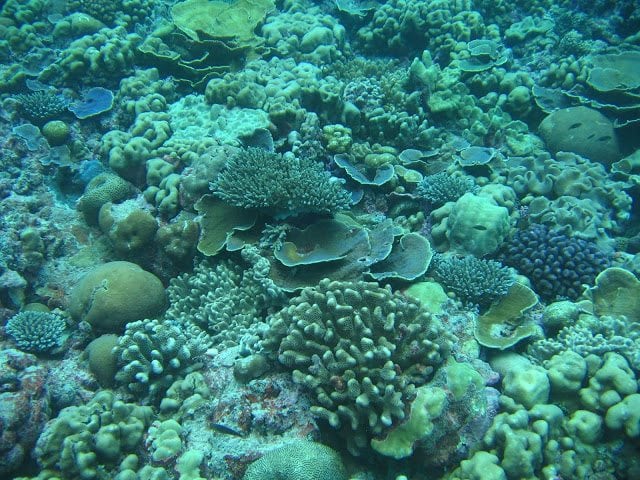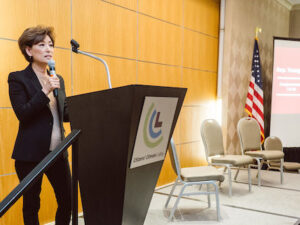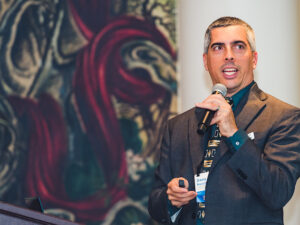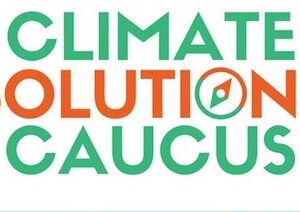With coral threatened by climate change, a Republican takes action
By Davia Rivka
Ileana Ros-Lehtinen, a Republican congresswoman from south Florida, burst on to the stage at the Citizens’ Climate Lobby conference and gave a low whistle as she looked out into the packed room.
“If I’d known how much fun you were, I would have come on board a long time ago,” she said, her infectious laugh filling the room. Her head barely grazing the top of the podium, I can tell she is a ball of fire, motion in search of a mission.
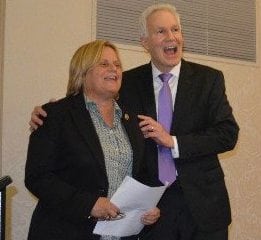
Jay Butera introduces Rep. Ileana Ros-Lehtinen at the CCL conference in June.
The congresswoman is one of the first Republican members of Congress to join the bipartisan Climate Solutions Caucus. In July, she introduced the Conserving Our Reefs and Livelihoods (CORAL) Act (H.R. 5771) — in response to the significant decline and disease of coral reefs and ecosystems over the last four decades. The CORAL Act would amend and reauthorize the Coral Reef Conservation Act of 2000. According to a statement from her office, the legislation “incentivizes research to develop the cutting edge techniques and tools that will be needed to restore our coral reefs for the benefit of generations of South Floridians to come.”
My hat goes off to her and every other Republican member of Congress who speak up about climate change. It can’t be easy.
She is a woman with an ability to listen across party lines and a willingness to speak out on contentious issues. She takes her job seriously and seriously knows how to laugh. That’s why she is my new climate change hero.
I was curious to discover why the CORAL Act is so important and what makes the congresswoman tick, so I checked in with her staff; Keith Fernandez, communications director and Wes Brooks, legislative aide.
“For starters,” I say, “why are the coral reefs such a big deal?” (I was secretly embarrassed to ask, because I knew enough to know that the health of the coral reefs is some kind of barometer and that as a “climate change warrior” I should know the answer. Well, as my dad used to say, “learn something new every day!”)
“The coral reefs are like nurseries.” Wes tells me. I imagine a whole bunch of little kids in a sandbox with runny noses and dirt on their faces. Turns out he means fish nurseries. Coral reefs create specialized habitats that provide shelter, food and breeding sites for all sorts of marine plants and animals. And when they’re strong enough, they go out into the big waters. So I wasn’t so far off base when I imagined nursery schools — where kids are nurtured so they can grow big and strong and go out into the chaotic world.
The coral reefs give fish a head start. And those fish are an important economic engine in South Florida, contributing to billions in additional revenue generated through fishing, diving, recreation, and tourism. In addition to the economy, healthy coral growth mitigates against the potentially devastating impacts of storms on the Florida coast, the result of rising sea levels.
“Okay, I get why saving the coral reefs is so important. Now the magic part. How the heck did the congresswoman get buy-in from such a vast and disparate group of folks?”
Wes and Keith tell me not only is the congresswoman a good listener, but she knows how to bring strange bedfellows to the table for a conversation that is much bigger than party politics. It’s no secret that this nation is highly polarized and divided on the subject of climate change. Sometimes just saying those two words creates a great flapping of wings and a mass exodus. She has spent her career building relationships in the community and on both sides of the aisle. She is a trusted voice. When she invited the players to the table, they came. Leaders in the local commercial fishing industry, local environmental groups like the Coral Reef Foundation, recreational fishing groups, national boating associations, and research universities. She asked how damaged and dying coral reefs are affecting their businesses or organizations. I’m sure she chose her words wisely — creating a safe place for all parties to express their concerns. Quite possibly, she never even used the words climate change.
Okay, at this point in the conversation, I know why the coral reefs are so important, and I know how the congresswoman got buy-in from unlikely constituencies that may not normally see eye-to-eye. The big question, the real fundamental question: Is it possible to restore the coral reefs?
Wes told me that full restoration is not likely but lots of work is being done to find ways to grow more coral. I imagine women and men hunched over their microscopes with tweezers coaxing the coral to grow. That’s not exactly how it happens. But the way it happens is even more crazy. Some are grown in aquariums and then planted on the reef directly, others are farmed in offshore nurseries and then planted on the reef.
Start small and nurture.
“What’s next and how can we help?” I ask Wes and Keith.
The bill has been introduced. The big push for co-sponsors comes this month. Keith tells me the more co-sponsors, the better. The more Democrats and Republican’s working together, the better. The more co-sponsors from land-locked states who understand how the loss of coral reefs will have a ripple effect on their lives, the better.
Here’s where you come in. Talk to your member of Congress. Find out if fish or snorkeling or storms or relatives in Florida might be important to your member of Congress. If so, ask them to co-sponsor the legislation.
This legislation is seeding the way for other bipartisan climate change legislation. Start small and nurture. The CORAL Act is one key piece of legislation that will have an impact on climate change. One piece of legislation that is seeking voices from both sides of the aisle. Like coral fragments grown in aquarium tanks and nurtured to grow bigger for planting on the reef.
Thank you Congresswoman Ileana Ros-Lehtinen, for your brazen, compassionate, egalitarian and far-sighted vision. We need more voices like yours.

